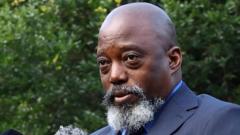The Democratic Republic of Congo (DRC) Senate has formally removed former President Joseph Kabila's legal immunity, clearing the path for treason charges against him. Kabila, who served as the nation's leader from 2001 until 2019, is accused of supporting the M23 rebel group in the eastern part of the country. This allegation comes amid ongoing violence as the M23 has seized multiple towns, fueling unrest in this resource-rich region.
The Senate voted overwhelmingly, with 90 votes in favor and just five against, to authorize Kabila's prosecution. Senate Speaker Jean-Michel Sama Lukonde announced, "The senate authorizes the prosecution and lifting of Joseph Kabila's immunity." Notably, Kabila, who was granted the title of "senator for life" after his presidency, did not attend the Senate proceedings to make a defense.
Kabila, 53, has consistently denied any links to the rebels, and his party, the People's Party for Reconstruction and Democracy (PPRD), condemned the prosecution as a theatrical distraction from the country's pressing issues. The DRC's military prosecutor sought to lift Kabila's immunity in light of substantial evidence suggesting his involvement with the M23, which has been embroiled in conflict since 2012.
In recent years, Kabila has resided outside the DRC, primarily in South Africa. Despite plans to return and assist in resolving the escalating conflict, his political party previously denied reports of his presence in Goma, a city captured by the M23. The Justice Minister Mutamba has ordered the seizure of Kabila's assets and urged him to return to face justice.
As conflicts in the east continue, analysts warn that Kabila's trial could further destabilize the nation. Meanwhile, there are indications that the DRC and Rwanda may be opening discussions for a peace deal to address the ongoing violence, which has displaced thousands of civilians.
The current situation remains tense as the DRC government seeks accountability from past leaders, culminating in the call for Kabila to confront serious accusations against him while the nation grapples with the ramifications of persistent armed conflict.
The Senate voted overwhelmingly, with 90 votes in favor and just five against, to authorize Kabila's prosecution. Senate Speaker Jean-Michel Sama Lukonde announced, "The senate authorizes the prosecution and lifting of Joseph Kabila's immunity." Notably, Kabila, who was granted the title of "senator for life" after his presidency, did not attend the Senate proceedings to make a defense.
Kabila, 53, has consistently denied any links to the rebels, and his party, the People's Party for Reconstruction and Democracy (PPRD), condemned the prosecution as a theatrical distraction from the country's pressing issues. The DRC's military prosecutor sought to lift Kabila's immunity in light of substantial evidence suggesting his involvement with the M23, which has been embroiled in conflict since 2012.
In recent years, Kabila has resided outside the DRC, primarily in South Africa. Despite plans to return and assist in resolving the escalating conflict, his political party previously denied reports of his presence in Goma, a city captured by the M23. The Justice Minister Mutamba has ordered the seizure of Kabila's assets and urged him to return to face justice.
As conflicts in the east continue, analysts warn that Kabila's trial could further destabilize the nation. Meanwhile, there are indications that the DRC and Rwanda may be opening discussions for a peace deal to address the ongoing violence, which has displaced thousands of civilians.
The current situation remains tense as the DRC government seeks accountability from past leaders, culminating in the call for Kabila to confront serious accusations against him while the nation grapples with the ramifications of persistent armed conflict.


















